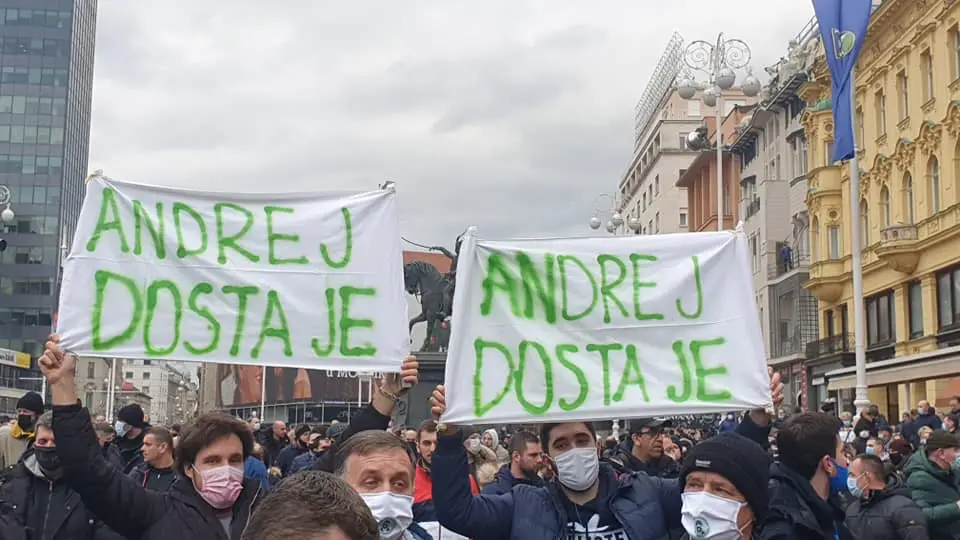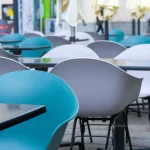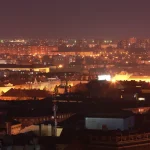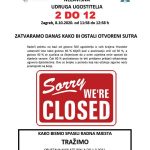Index.hr reports:
“At the end of the month, on Friday, February 26, we will again organize a protest at Ban Jelačić Square if the epidemiological situation improves and discriminatory measures against entrepreneurs continue. We are also asking the government for fair compensation for closing facilities because all they give us now is only 25 to 30 percent of the revenue we have lost. In contrast, Germany and Austria’s governments, for example, give their entrepreneurs compensation of 70 to 75 percent of the lost revenue and thus save them. This does not only apply to cafes, which are closed, but also in activities such as the event industry, occasional transport, travel agencies, and tourist guides, which can work but due to the measures, they have practically no one, which puts them in a challenging situation,” explains the executive director of the Voice of Entrepreneurs Association, Dražen Oreščanin.
He adds that entrepreneurs are asking the government to finally adopt a “corona traffic light” based on which it would be determined which epidemiological measures are being adopted in which conditions. He notes that something like this should be adopted at the regional level, which would enable entrepreneurs and citizens to prepare for certain measures.
Oreščanin emphasizes that entrepreneurs are not against epidemiological measures, but they are against their selective application, so some entrepreneurs are denied the right to work.
“We do not interfere in epidemiological measures; we respect them. We also called at the protest that all those gathered adhere to epidemiological measures. However, we demand that the government treat us all equally and that we all have equal rights,” Oreščanin said.
He also criticizes the government for insufficient communication with entrepreneurs and calls out the Voice of Entrepreneurs for politicking, which he strongly rejects. Entrepreneurs, he says, are on the brink, and their situation is deteriorating. In such conditions, they have no choice but to take to the streets and warn of problems.
“We expect the government to start behaving like governments in democracies finally. Instead of communicating with us, it tries to discourage and discredit us and throws spins to portray us as enemies of the Headquarters and the state. But that’s not the case, the government doesn’t communicate with us,” points out Oreščanin.
But all this comes at a price, and in the crisis, which continues this year, the state treasury will hardly have enough money to feed all appetites. Especially if it turns out that the recovery will go much slower than expected.
In such conditions, economic analyst Damir Novotny warns that the straw of salvation for Plenković’s government should be provided by money from EU funds. But, he says, the government will have to work harder for that. First, it should quickly adopt a program to use Union funds and speed up its withdrawal, rather than procrastinate, as before.
“Croatia has a lot of money at its disposal, allocated by Brussels, a total of over 20 billion euros, and that money should be used. The government must not bureaucratize and delay but should adopt a plan for using that money. That money can save us from social collapse because the implementation of the projects financed by it will stimulate economic growth and demand for labor,” Novotny explains for Index.
Novotny also sees a chance to hire an increasing number of unemployed in the reconstruction of Zagreb and other areas affected by the earthquakes. Reconstruction projects will require a lot of manpower and various profiles.
He also says that he does not expect major social unrest in Croatia for the time being. Still, he also warns that the continuation of the corona crisis also means the collapse of some companies, which will result in higher unemployment. The domino effect could also be social unrest.
“If the crisis continues, there will be social problems,” Novotny said.
However, Croatia should also start working on the challenges that await it even after the corona crisis. Namely, it is already clear, Novotny points out, that it will take years for tourism to return to the levels before the outbreak of the coronavirus pandemic, and companies will have to survive in that period as well. He also believes that several activities, including catering, should work on digitally transforming their business. Besides, companies should no longer be put in a position if they have not accumulated enough capital for future crises.
“Changes in the structure of the Croatian economy can be expected. The importance of modern industry and construction will increase, and the role of tourism and catering will decrease. Also, we will have to try to attract more foreign investment,” Novotny concluded.
To read more about COVID-19 in Croatia, follow TCN’s dedicated page.











